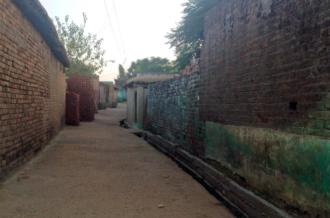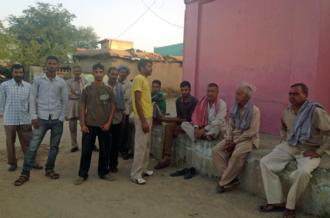Villagers bear brunt of Kashmir shelling
Cross-border clashes between India and Pakistan in the disputed region disrupts lives and forces thousands to flee.

Jammu, Indian-administered Kashmir – On Thursday night, the commotion in the government hospital in Jammu city in Indian-administered Kashmir became background noise to the howls of two brothers, who clung to their father’s dead body, lying on a rickety stretcher, covered in a white shroud.
The elderly farmer had died in a road accident near his village while trying to escape the bullets and mortar shells, which had been fired from across the border in Pakistan. Two of their other family members were also injured.
Keep reading
list of 4 itemsSudan war could lead to more ethnic killings in volatile Darfur region
Why is Iran’s President Ebrahim Raisi visiting Pakistan?
Russia-Ukraine war: List of key events, day 788
“No, God, no,” sobbed Rash Pal, his 40-year-old son, whose shirt was smeared with his father’s blood. “What did we do to deserve this?”
For the past four days, Pal, a 40-year-old labourer, told Al Jazeera that his village, 25km away from the city, has been caught in a deadly exchange of firepower between India and Pakistan on the border, which intensified after sunset. Every evening, he said, his family members left their village and took shelter in a wedding hall, which was at a distance from the border.
The brothers said that the security forces had provided armoured Matadors for the villagers to escape, but the drivers were civilians, who were not trained to handle the army vehicles.
On Friday, the firing had already started when their family members ran out of their homes and leaped into an overcrowded Matador, which flipped over on a narrow road.
“It all happened so quickly. There was firing, everyone was running and too many people were in the Matador,” said Pal. “If my father’s fate was to die then why did we run at all? Getting shot by a bullet would have been less painful.”
Finding shelter
The mortar shelling and the firing of weapons has continued for five days on the international border and the Line of Control, which is the de facto border between India and Pakistan in the disputed region.
Both countries have gone to war three times over Kashmir, which is divided between the two countries. The recent escalation of tensions between the nuclear-armed neighbours is regarded as a threat to the international peace and security in the region.
 |
|
Those had to sleep under the tents in the relief camp complained of the cold [Betwa Sharma/ Al Jazeera] |
While Islamabad and New Delhi are trading blame over the ceasefire violations, thousands have been forced to abandon their villages close to the borders in the Jammu region. Some have moved in with relatives, who live further from the border. Others have found shelter in wedding halls, schools buildings and the open spaces of ashrams, which are spiritual havens in Indian culture.
The local media has reported that seven people have been killed on the Indian side, 80 injured and more than 30,000 people have been displaced along the 190km long border. At least 10 people have been killed on Pakistani side of the border.
The Indian media has also reported that 22 relief camps being run by the government for people hit by the cross-border violence. One camp being run in the high school of Salehar village in the RS Pora sector is housing 1,870 people from seven villages.
Camp organisers said that the number of displaced had risen from 325 on October 6 when the shelling intensified.
“It is hard to say whether the numbers will go up or down,” said Buaditta, a government official, who was overseeing the camp. “If there is no firing today then the numbers may go down. But then the other side cannot be trusted.”
Pooja Devi, a 20-year-old from Treva village, who studies in class 12, had come to the camp for the second time.
“I don’t know how to study for my exams,” she said. “I had to leave my books at home.”
‘So much blood’
While many villagers are used to outbreaks of violence on the border, most of them don’t recall being caught in the middle of such a prolonged and intense shelling. They worry about the crops in their fields, now riddled with the fragments of exploding mortars, and the welfare of the animals, the source of their livelihood.
A cow bellowed loudly in the front yard of Boti Ram, a farmer from Chilayari village, whose wife and daughter-in-law were killed when two mortars exploded in their house on Wednesday morning. The pink walls of their home are riddled with big holes from the splinters and blood still stains the floor of two rooms.
 |
| Chilayari village, which is close to the border, has been abandoned as thousands were forced to leave in the wake of the shellings [Betwa Sharma/ Al Jazeera] |
“The cow is crying because there is no one to feed it or give it water,” said Tirath Ram, a relative of Boti Ram, who had returned to the village after performing the final rites for the dead women. “Our animals will die or run away if we cannot take care of them.”
Tirath Ram, who lives next to Boti Ram, had just woken up when he heard the deafening explosion on Wednesday. “When I got to their house, I couldn’t see because there was so much smoke. When the smoke cleared, there was blood. So much blood,” he said.
At the government hospital in Jammu, 60km away from the village, the elderly Boti Ram and his two grandsons were lying on three beds covered in bandages and tubes.
After several years of relative peace on the border, the villagers are dreading that the violence, which has disrupted their lives this week, will become more frequent if relations between India and Pakistan deteriorate.
Analysts on the Indian side attribute the cross-border violence to Pakistan’s frustration over Indian Prime Minister Narendra Modi’s tough stand on Kashmir. In August, Modi cancelled talks between the foreign secretaries of both countries after Pakistan’s high commissioner arranged meetings with Kashmiri rebels.The Indians say that ceasefire violations from Pakistan have been rising for the past four years: 44 occurred in 2010, 51 in 2011, 93 in 2012 and 195 in 2013.
Pakistan’s Prime Minister Nawaz Sharif raised the issue of Kashmir at a UN meeting last month, a step the Indian prime minister said would not help the neighbours resolve their differences.
“Pakistan is probably frustrated being thwarted in its efforts to internationalise Kashmir,” Neelam Deo, a foreign policy expert from the Mumbai-based Gateway House, said.
“But they are also rattled at how well the visit of Prime Minister Modi to Washington went especially because their joint statement named anti-India terrorist groups based in Pakistan,” she told Al Jazeera.
Life on the border
Villagers echoed similar sentiments.
“It is like two farmers fighting over a field but no one can resolve the problem. India will never give up Kashmir,” said Tirlok Chand, a 21-year-old student from Chilayari village, who was attempting to contact relatives to find a place to stay for the night. “We are sick of being caught in the middle but India is giving a good response to Pakistan.”
Tirath Ram, who was going to stay with relatives in nearest town of Samba, had returned after the funeral to check on the locks of his house.
 |
| Residents of Chilayari village, which was hit by bullets, returned to check their property [Betwa Sharma/Al Jazeera] |
“We have built these homes with our sweat and tears. We cannot live under the constant threat of an explosion,” he said. “It is better to have one big war than hundreds of these small battles every year.”
Some residents of Chilayari village also said that they had felt the cross-border violence rise over the past two years. But this was the first time that many of them had left their homes to take refuge in the open space of an ashram, 15km away from the village.
The womenfolk did the cooking while the men kept a vigil out for intruders. But they worried all nights about the safety and security of their homes.
Since the worst period of the gunfire was mostly from sunset to the morning, some men return in the day to check on their property and feed their animals.
At sunset, a group of men in the Chilayari, who were discussing the cross-border violence and the politics of Kashmir, began to leave for the ashram.
“Hurry up. It could start anytime now,” said Gopal Singh, a 25-year-old labourer, told his friends.
Singh, who had decided to stay in the village to guard his property, said that he was tired of tossing and turning in the cold night air at the ashram.
“How long can we be afraid? Even if this round of firing stops, who can say when the next shell will explode here, next week or next month,” he said. “This is life on the border.”
Follow Betwa Sharma on Twitter: @betwasharma